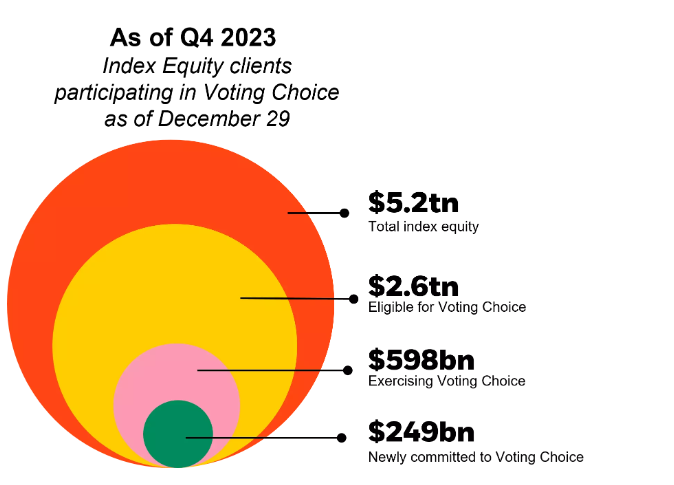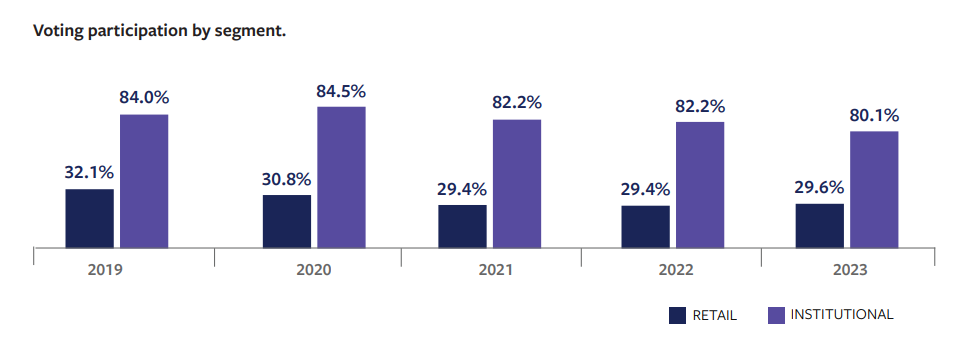BlackRock’s Voting Choice Program Expands to Individual Retail Investors
By Jose Furman, Principal
Share
As part of its commitment to investor transparency, BlackRock recently announced a U.S. Pilot Program that would give certain individual retail investors the ability to participate in the “Voting Choice” program, which enables individual investors to vote based on guidelines other than BlackRock’s internal policy-driven position. Initially, only certain institutional clients were granted the ability to directly engage in the proxy voting process, also known as pass-through voting. The expansion of the program to retail investors would increase the total eligible assets under the Voting Choice program to $2.6 trillion, which is roughly 50% of all Blackrock’s equity assets under management. In comparison, as of Q4 2023, ~25% of the $2.6 trillion in eligible assets ($598 Billion) were participating in the “Voting Choice” program.

Source: BlackRock. Client funds participating in BlackRock Voting Choice are as of December 29, 2023. Assets include index equity assets held in multi-asset fund of funds strategies. Note: Newly committed Voting Choice AUM includes pooled fund clients that have elected BlackRock Voting Choice options 1 or 3 and separate account clients that have elected BlackRock Voting Choice options 2 or 3. Certain institutional pooled funds that implement Systematic Active Equity (SAE) strategies are also eligible for BlackRock Voting Choice but are not displayed in the chart. Eligible SAE institutional pooled funds and separate accounts amount to $104bn in eligible Voting Choice assets. All currency shown in USD.
Individual retail investors will be given the option to choose from one of seven policies (including the current BlackRock Investment Stewardship Policy), which includes 3 from ISS and 3 from Glass Lewis. The policy options differ based on alignment towards social, religious, environmental, or corporate-governance voting preferences:
- BlackRock Investment Stewardship Policy
- ISS - Socially Responsible Investment (SRI) Policy
- ISS - Catholic Faith-Based Policy
- ISS - Global Board-Aligned Policy
- Glass Lewis - Benchmark Policy
- Glass Lewis – Climate Policy
- Glass Lewis - Corporate Governance-Focused Policy
In addition to BlackRock, other large asset managers such as Vanguard and State Street are developing similar pass-through voting programs and offer comparable choices to those listed above. The developments come amid increasing scrutiny on the influence asset management companies have over corporate decision-making, given their significant ownership stake. Additionally, there is pressure from institutional clients for these companies to align with their specific views on corporate governance, compensation, and Environmental/Sustainability related topics. By giving individual investors the ability to vote directly, the objective is to enhance shareholder engagement in a manner that reflects the individual investor’s values and preferences. As this trend toward pass-through voting continues to grow, what should Boards be cognizant of?
AGM Proposal Support Levels
Retail investors constitute approximately 32% of all eligible voting shares, while institutional investors control the remaining 68%. However, in terms of voting participation, fewer than 30% of retail shares are typically voted, in contrast to the 80% participation rate among institutional investors.

Source: Broadridge ProxyPulse 2023 proxy season
Most large asset managers have their own stewardship/voting policies and do not vote in lockstep with ISS and Glass Lewis vote recommendations. As the mix of shares voted potentially shifts from an asset manager’s own “house policies” to the retail investors’ voting choice, companies should prepare for volatility in proposal support levels when comparing year-over-year, as this development could increase the influence of ISS and Glass Lewis vote recommendations, as discussed below. The extent to which individual retail investors will utilize pass-through voting remains uncertain.
More influence for ISS and Glass Lewis
For the new pilot program, BlackRock’s retail investors can choose from 7 voting policies (6 of which are offered by ISS or Glass Lewis). Shares will be automatically voted for each proposal based on the vote recommendations for the select policy. This gives ISS and Glass Lewis more influence as each vote recommendation included in their research reports could potentially prompt millions of retail shares to vote in lockstep.
With respect to say-on-pay and compensation matters, companies can prepare by reviewing their current compensation programs through the lens of the ISS and Glass Lewis policies, running pay for performance sensitivity analyses, and carefully considering any special pay actions that cause misalignment of pay and performance and therefore lead to an “Against” vote recommendation from ISS or Glass Lewis. While this advance preparation can provide valuable foresight on expected vote outcomes, it is important to note that compensation structure, magnitude and outcomes should be specifically tailored to fit each company’s talent attraction, motivation and retention needs and may not necessarily align with prescriptive proxy voting policies.
Additional Observations on BlackRock’s Expanding “Voting Choice" Policy:
The types of proposals most likely to be impacted by the trend towards pass-through voting are those related to Governance and Environmental/Sustainability. Typically, these proposals are initiated by shareholders and management opposes their implementation, citing concerns about their alignment with the company's best interests. Management usually recommends that shareholders vote "against" such proposals. In such cases, BlackRock tends to side with management, while ISS and Glass Lewis often support the proposals. All else being equal, companies should anticipate these proposals receiving relatively stronger levels of support as pass-through voting becomes more prevalent.
Regarding compensation-related Say-on-Pay (SOP) proposals, the policies from ISS and Glass Lewis appear to exhibit a considerable degree of consistency among the options presented. As noted above, however, the Voting Choice program may result in ISS and Glass Lewis recommendations becoming more influential overall.
There will likely be continued pressure on Director election support levels that do not align with ISS and/or Glass Lewis stated policies. Most of which are related to independence, responsiveness, over boarding, or lack of diversity.
FW Cook will monitor data provided by proxy advisory firms and other organizations involved in proxy statement voting administration. We are committed to providing updates on any significant developments identified through future postings.
 Jose Furman
Jose Furman
Principal
Jose Furman's primary responsibilities include conducting market research and analyzing pay levels, designing incentive plans, and examining market trends. Representative projects include leverage performance unit modeling, extensive pay-for-performance analyses, realizable compensation, and new-hire CEO recruiting compensation packages.
